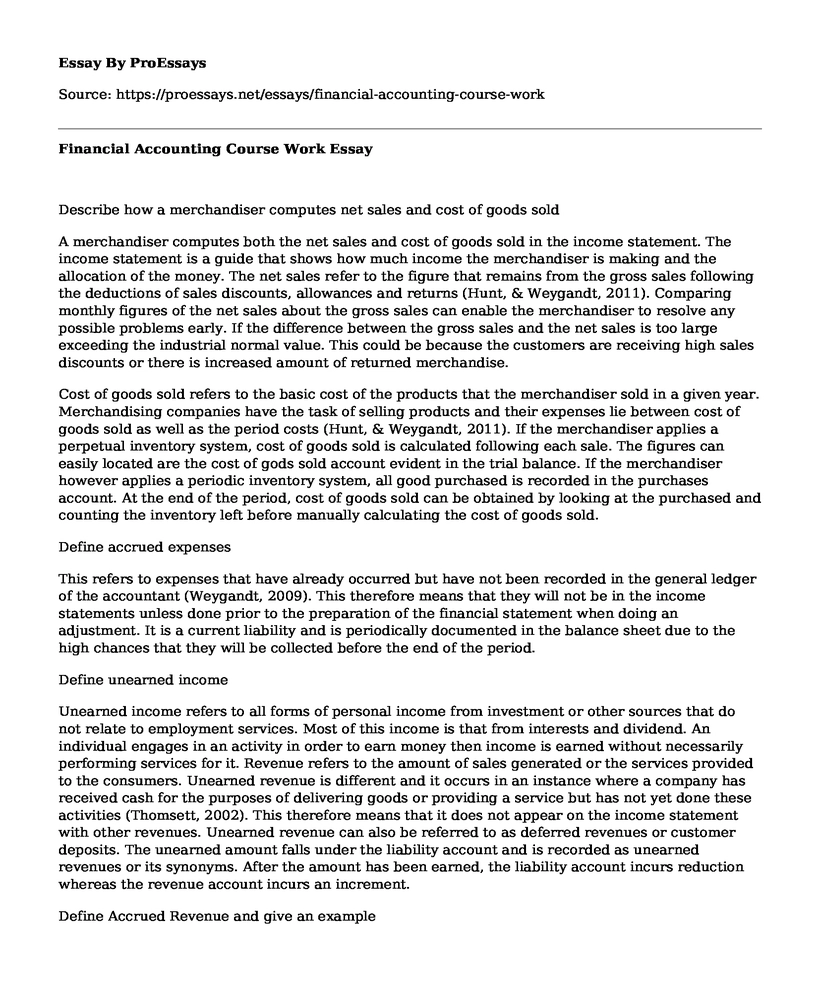Describe how a merchandiser computes net sales and cost of goods sold
A merchandiser computes both the net sales and cost of goods sold in the income statement. The income statement is a guide that shows how much income the merchandiser is making and the allocation of the money. The net sales refer to the figure that remains from the gross sales following the deductions of sales discounts, allowances and returns (Hunt, & Weygandt, 2011). Comparing monthly figures of the net sales about the gross sales can enable the merchandiser to resolve any possible problems early. If the difference between the gross sales and the net sales is too large exceeding the industrial normal value. This could be because the customers are receiving high sales discounts or there is increased amount of returned merchandise.
Cost of goods sold refers to the basic cost of the products that the merchandiser sold in a given year. Merchandising companies have the task of selling products and their expenses lie between cost of goods sold as well as the period costs (Hunt, & Weygandt, 2011). If the merchandiser applies a perpetual inventory system, cost of goods sold is calculated following each sale. The figures can easily located are the cost of gods sold account evident in the trial balance. If the merchandiser however applies a periodic inventory system, all good purchased is recorded in the purchases account. At the end of the period, cost of goods sold can be obtained by looking at the purchased and counting the inventory left before manually calculating the cost of goods sold.
Define accrued expenses
This refers to expenses that have already occurred but have not been recorded in the general ledger of the accountant (Weygandt, 2009). This therefore means that they will not be in the income statements unless done prior to the preparation of the financial statement when doing an adjustment. It is a current liability and is periodically documented in the balance sheet due to the high chances that they will be collected before the end of the period.
Define unearned income
Unearned income refers to all forms of personal income from investment or other sources that do not relate to employment services. Most of this income is that from interests and dividend. An individual engages in an activity in order to earn money then income is earned without necessarily performing services for it. Revenue refers to the amount of sales generated or the services provided to the consumers. Unearned revenue is different and it occurs in an instance where a company has received cash for the purposes of delivering goods or providing a service but has not yet done these activities (Thomsett, 2002). This therefore means that it does not appear on the income statement with other revenues. Unearned revenue can also be referred to as deferred revenues or customer deposits. The unearned amount falls under the liability account and is recorded as unearned revenues or its synonyms. After the amount has been earned, the liability account incurs reduction whereas the revenue account incurs an increment.
Define Accrued Revenue and give an example
Accrued revenue refers to the goods and services that have been provided (Weygandt, 2009). Accrued revenue is recorded as an asset on the balance sheet. It is necessary to register this information since it is critical in company valuation especially where billing occurs after service is completed. Accrued revenue encompasses items that will not be recorded anywhere in the general ledger at the end of the stipulated period. Examples of accrued revenue are such as income due in arrears. It is recorded in the financial system with an adjusting entry, which is often reversed in a future period to avoid accruals.
References
Hunt, M. F., & Weygandt, J. J. (2011). Problem-solving survival guide to accompany Financial accounting, 7th edition [by] Jerry J. Weygandt, Donald E. Kieso, Paul D. Kimmel. Hoboken, NJ: Wiley.
Thomsett, M. C. (2002). Builder's guide to accounting. Carlsbad, CA: Craftsman Book Co.
Weygandt, J. J. (2009). Financial accounting. Hoboken, N.J: Wiley.
Cite this page
Financial Accounting Course Work. (2021, Jun 18). Retrieved from https://proessays.net/essays/financial-accounting-course-work
If you are the original author of this essay and no longer wish to have it published on the ProEssays website, please click below to request its removal:
- Is Going to College Worth It? - Essay Sample
- Present Value of Payments Assigment
- Essay Sample on Foreign Direct Investment
- Risk Assessment Stage - Essay Sample
- Operating Budget Estimates - Essay Sample
- Essay Example on Medicare: Federal Health Insurance Program for Seniors Above 65
- Paper Sample: Main Ideas and Applications of Cryptocurrencies







